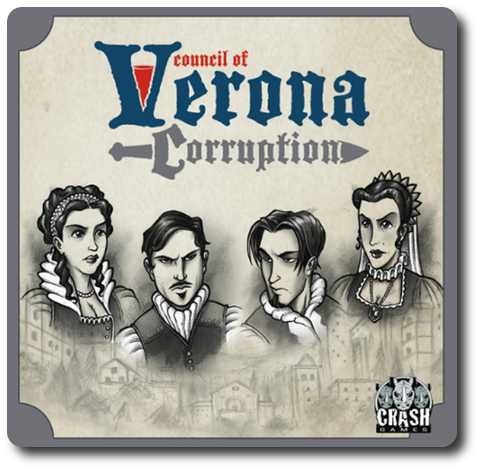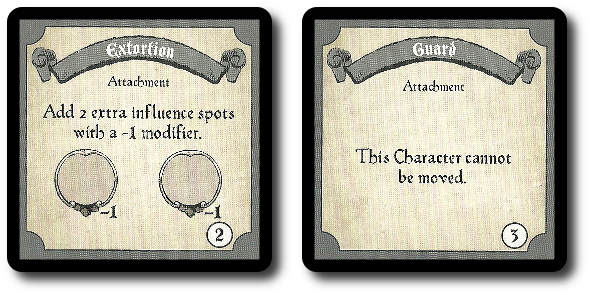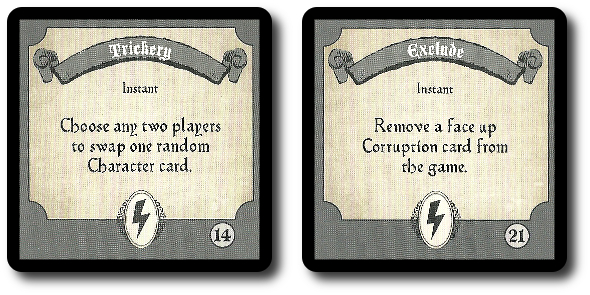
The Basics:
- For ages 8 and up (publisher suggests 13+)
- For 2 to 5 players
- Variable game play length
Geek Skills:
- Active Listening & Communication
- Counting & Math
- Logical & Critical Decision Making
- Reading
- Pattern Matching
- Strategy & Tactics
- Risk vs. Reward
- Hand/Resource Management
- Bluffing and Misdirection
Learning Curve:
- Child – Easy
- Adult – Easy
Theme & Narrative:
- Everyone has their price…
Endorsements:
- Gamer Geek approved!
- Parent Geek approved!
- Child Geek approved!
Overview
French author and a soldier in World War I, Georges Bernanos, said “The first sign of corruption in a society that is still alive is that the end justifies the means.” But what if the end is believed to be righteous even though the means may seem unjust? History is written by those who survive to write it, trumping opposing opinions in the process. In this game, corrupting others is essential to victory.
Council of Verona: Corruption, designed by Patrick Nickell, Michael Eskue and published by Crash Games, is comprised of 21 Corruption cards and 1 cloth bag. The cards are durable and as thick as your standard playing card. This is an expansion to Council of Verona, which is required to play.
The Corruption That Dwells Within Us
Note: We will not discuss how to set up and play the base game, Council of Verona. Read our review of the base game for full details on how the game is played, won, and enjoyed.
After the Character cards have been shuffled, dealt, and drafted, 4 Corruption cards are dealt to each player, face-down. From these 4 Corruption cards, each player selects 2 to keep and 2 to discard. The discarded Corruption cards are returned to the game box, but the 2 Corruption cards that are kept remain in front of the player, face-down. There are two different types of Corruption cards the player can use.
Attachment Corruption Cards
These Corruption cards are placed below and move with Character cards. They will either add an additional Influence slot or a rule that changes how the Character card is played or scored. Once played, they remain until the game is over.

Instant Action Corruption Cards
These Corruption cards provide the player with a one time special action. Timing is important if the player is to maximize the card’s effects and benefits.

Oh, What Scandal, What Deception!
At anytime during the player’s turn, they have the option to play 1 Corruption card. There are several ways a player can use their corruption card beyond the effect it lists. It’s also worth noting that any number of Corruption cards can be played to a single Character card.
Corrupt a Character
If the Corruption card is an Attachment, the player can play it to any Character card currently in play. If played face-up, the Corruption card and its effects are now active for the duration of the game.
Take an Action
If the Corruption card is an Instant Action, the player reveals their Corruption card, announces the action, and then resolves it. The Corruption card is then discarded and remains so for the duration of the game unless it makes sense to keep it out and next to the Character card it is corrupting.
Bluff
Bluffing is a vital component to the game play, as players must secretly back and back stab the Character cards. To further shroud the player’s objective, a Corruption card can be played face-down to a Character card as if it was an Attachment card. Which it might very well be, but it could also be an Instant Action card. The intent is to bluff the other opponents into thinking that the Corruption card played is or is not what the player wants them to think. Face-down Corruption cards are only revealed at the end of the game. If the effect of the card is applicable, it’s resolved. If not, the effect of simply bluffing that something of value was under the card was worth the effort.
May the Best of Us Rise to Our Place
Game play continues as described in the base game review with the additional ability to play a Corruption card. At the end of the game, when players are given the opportunity to play 1 last Influence token, they may also play 1 Corruption card. Any Corruption cards not used during game play are discarded before scoring.
Scoring the game is a bit more complicated with the Corruption cards in play, since they change the normal rules and add conditional statements or Influence slots. In all cases, each Character card should be scored separately and the totals recorded for the round for each player. When the game is over, the player with the most points wins.
To learn more about Council of Verona: Corruption, visit the publisher’s website.
Final Word
The goal of any expansion should be to elevate the base game to a new height and offer players an opportunity to explore new means of play without requiring a lot of new rules to be learned in the process. In short, expansions should, in my opinion, truly expand the game’s depth, strategy, tactics, and most importantly, fun. Not just add more “stuff” or fix an issue in the base game. Council of Verona: Corruption is an excellent example of a game expansion that does it right. It takes the base game, gives it a boost, and never once demands a great deal more from the players.
Let’s focus on the specifics, as colorful gushing is not new in the world of gaming enthusiast, but nor is it helpful. First, this expansion will not magically make anyone who does not like Council of Verona suddenly fall in love with it. It’s not that kind of expansion. Second, this expansion adds a new layer of bluffing and manipulation to the game, providing players an additional means of either sneaking in points or screwing up an opponent. Third, and most importantly, the expansion does not add more time to the game other than that which comes by default from thinking which cards to play and counting points. The expansion will most likely also make a few players pause a few seconds longer than they would otherwise when they attempt to consider the implications of face-down Corruption card in play.
Several of our players, the Gamer Geeks specifically, were not sure the expansion was necessary. This is a common question asked by many when a new expansion is offered for the game and its impact on the overall game play is not strongly felt. In this case, I would argue that Council of Verona: Corruption is doing it right. It fits seamlessly into the game and the game play, becoming a natural extension of the player’s strategic and tactical game play. It doesn’t feel like it’s adding much because it dissolves into the game’s background. It’s when you score points you realize how influential the Corruption cards truly are. All it takes is 1 point more than an opponent to beat them. With the Corruption cards, you can win the game by several points and your opponents will never see it coming.
Council of Verona remains one of my favorite Bluffing games. It’s light and strategic, the depth of game play is always surprising, and it has always left me feeling satisfied. This new expansion, Council of Verona: Corruption adds a new layer without adding new burden. It further emphasizes to the player’s the power of subtle manipulation, strategic timing, and tactical table talk that all serves to distract and smoke screen a player’s objective. If you are a fan of the original game, I am certain this game expansion will be a welcome and enjoyable addition.
This game was given to Father Geek as a review copy. Father Geek was not paid, bribed, wined, dined, or threatened in vain hopes of influencing this review. Such is the statuesque and legendary integrity of Father Geek.

